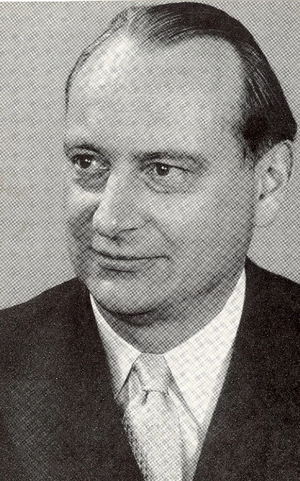Louis Ferdinand
| Louis Ferdinand | |||||
|---|---|---|---|---|---|
 | |||||
| King of Germany | |||||
| Reign | 1 January 1951 - 26 September 1994 | ||||
| Predecessor | Himself (as President of Germany) | ||||
| Successor | Georg Friedrich | ||||
| President of Germany | |||||
| In office | 16 November 1943 - 1 January 1951 | ||||
| Predecessor | Adolf Hitler (as Führer) | ||||
| Successor | Himself (as King of Germany) | ||||
| Chancellor of Germany | |||||
| In office | 16 November 1943 - 15 September 1949 | ||||
| Predecessor | Adolf Hitler | ||||
| Successor | Konrad Adenauer | ||||
| Born | 9 November 1908 Potsdam, German Empire | ||||
| Died | 24 September 1994 (aged 85) Berlin, Germany | ||||
| Burial | 1 October 1994 | ||||
| Spouse | |||||
| Issue Detail |
| ||||
| |||||
| House | Hohenzollern | ||||
| Father | German Crown Prince Wilhelm | ||||
| Mother | Duchess Cecilie of Mecklenburg-Schwerin | ||||
| Religion | Lutheranism | ||||
Louis Ferdinand (Louis Ferdinand Victor Eduard Adalbert Michael Hubertus Prinz von Preußen; 9 November 1908 - 26 September 1994) was King of Germany from 1 January 1951 to 26 September 1994. The son of German Crown Prince Wilhelm, Louis Ferdinand is the first monarch of post-war Germany following the restoration of the German monarchy as well as its longest-reigning monarch at forty-three years long.
Born in 1908 during the reign of his grandfather Wilhelm II, Louis Ferdinand initially spent some of his childhood in the United States before later returning to Germany where he developed an interest in aviation. Following the outbreak of the Second World War in 1939, Louis Ferdinand, together with several anti-Nazi officers worked to undermine the Nazi regime from within, a task in which they ultimately succeeded with the assassination of Adolf Hitler in 1943, thereby leaving the Nazi leadership vacant but was promptly taken up by Louis Ferdinand himself who, with the support of leading German military officers, subsequently negotiated a surrender with the Allies, effectively bringing the Second World War to an end. Following this, with support from the United States and the United Kingdom, Louis Ferdinand was later proclaimed as the first King of Germany on 1 January 1951, the 80th anniversary of the proclamation of Wilhelm I as German Emperor.
As the head of state of post-war Germany, Louis Ferdinand was an active opponent of both fascism and communism and otherwise a public supporter of the concept of a welfare state via the advancement and promotion of Rhine capitalism. In addition, Louis Ferdinand was also a staunch supporter of the North Atlantic Treaty Organisation and the European Economic Community which later became the European Union. Following the fall of the Soviet Union in 1991, Louis Ferdinand actively promoted rapprochement between Western European nations and the former Soviet states under a self-proclaimed vision of Größeres Europa ("Greater Europe"). In 1994, at the age of eighty-five, Louis Ferdinand passed away and was succeeded by his grandson, the reigning Georg Friedrich, having outlived his son and initial heir apparent Louis Ferdinand who died in 1977. Since then, due to his role in opposing the Nazi regime and later guiding Germany as head of state throughout the post-war era, Louis Ferdinand was posthumously honoured as Louis Ferdinand the Great (German: der Große).